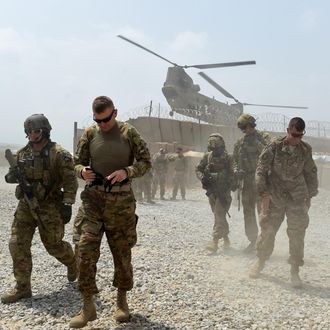
As the Taliban gains ground in Afghanistan, the New York Times reports that President Obama is considering backing off his plan to withdraw nearly all U.S. troops from the country by the end of his presidency.
Several anonymous senior officials within the Obama White House told the New York Times that the president appears “increasingly willing” to keep a several-thousand-member fighting force within Afghanistan, one tasked with countering Al Qaeda and Islamic State militants.
Obama has long intended to have all U.S. troops out of Afghanistan by the end of 2016, save a small force dedicated to the protection of the American embassy in Kabul. But the Taliban has made significant advances in recent months — a recent UN report found that the group’s insurgents are more widespread in Afghanistan than at any time since 2001. This resurgence was underlined by the late-September capture of Kunduz, the largest city to fall under Taliban control since the U.S.-led invasion deposed its regime in 2001.
At the same time, Al Qaeda operatives continue to make safe havens in the country’s mountains and the Islamic State is reportedly growing its presence in the region, as disaffected Taliban fighters are recruited into “the caliphate.”
Those developments have spurred elements of the military and foreign-policy Establishment to lobby aggressively for an extended U.S. presence in Afghanistan. The Times reports that a new paper by the Atlantic Council, which calls for current force levels to be maintained, has earned the signatures of more than 20 former senior officials, including Clinton-era Secretary of State Madeleine Albright.
Obama remains opposed to maintaining the current deployment of 9,800 U.S. soldiers, but is seriously considering retaining a counter-terrorism force of no more than 5,000 soldiers, according to reports from both the Times and Washington Post.
The United States spent more than $65 billion since the war’s outset on building up the Afghan army and police force. Yet even with the support of 17,000 NATO troops, the nation’s security apparatus was unable to prevent the Taliban from taking Kunduz last month. While many cite such failures as evidence for the necessity of maintaining America’s military presence in the region, skeptics within the administration see them as proof of the war effort’s costliness and futility.
“Are we willing to spend — the numbers are fuzzy — but somewhere between $10 and $20 billion per year in perpetuity for the privilege of Afghanistan not totally collapsing,” Douglas Ollivant, a former member of the National Security Council during both the Obama and second Bush presidencies, asked the Times. “And we’re not talking about it being Xanadu — we’re talking about not collapsing.”






























